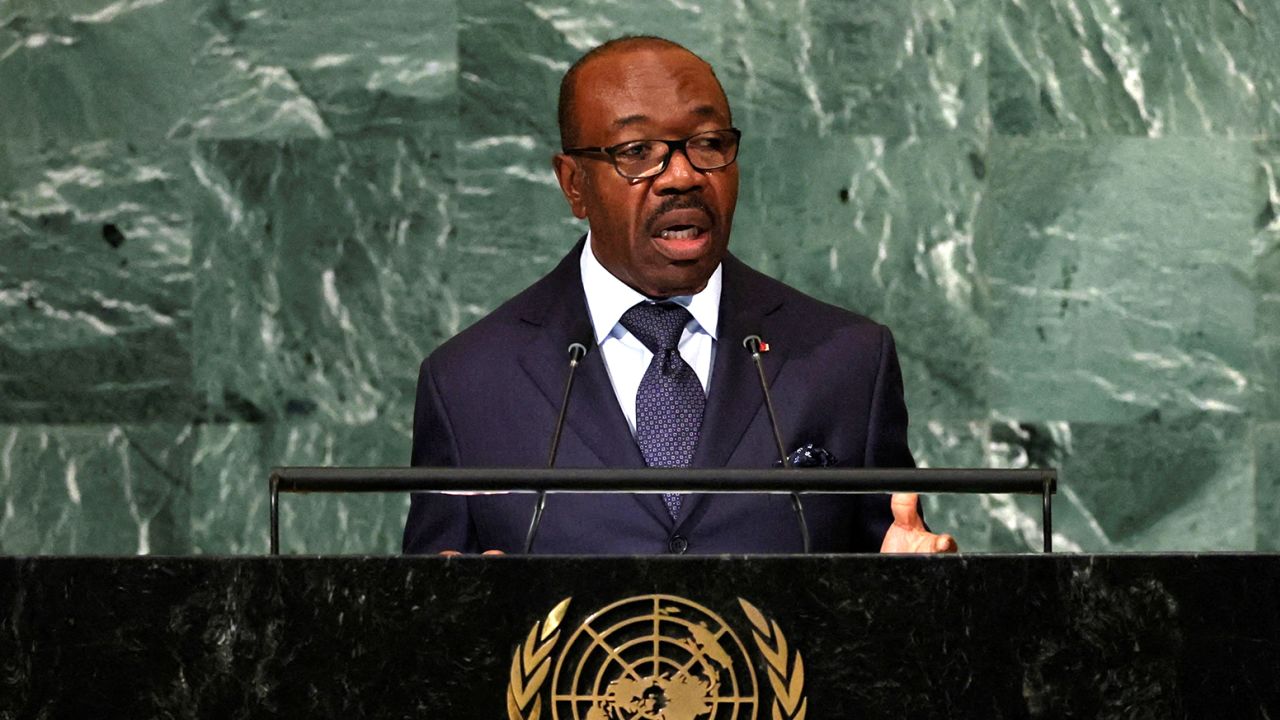CNN
—
Military officials in Gabon appeared on national television on Wednesday to announce they were seizing power, prompting reports of celebrations and gunfire on the streets of the capital.
The announcement came minutes after President Ali Bongo Ondimba, also known as Ali Bongo, was presumed the winner of a contested election, extending his family’s half-century rule over the central African nation.
Officials who claimed to represent the country’s “security and defense forces” made the announcement in a televised speech on news channel Gabon24. It was spotted by CNN on X, formerly known as Twitter.
“On behalf of the people of Kabonis and on behalf of the guarantor of the safety of the companies, CTRI [the Committee for the Transition and Restoration of Institutions] “It has decided to preserve peace by ending the regime,” an army official said in the broadcast.
CNN could not independently confirm the video, and the Gabon government could not yet be reached for comment.
In the broadcast, the military official said the election results would be annulled and the country’s borders would be closed.
“All the institutions of the Republic have been dissolved: especially the government, the Senate, the National Assembly, the Constitutional Court, the Economic and Social and Environmental Council and Gabon’s Elections Council,” the official said.
“We call on the Gabonese people, neighboring communities living in Gabon and the Gabonese diaspora to remain calm.”
Loud gunfire was heard in the capital Libreville, a Reuters reporter said following a televised appearance.
According to videos shared with CNN and posted on social media, people in Gabon were seen dancing and celebrating in the streets of its capital.
In a video obtained by CNN, people can be seen chanting “liberation”. and waving the Gabonese flag with military vehicles in the capital’s Nzeng Ayong district.
Five countries in West and Central Africa have already been taken over by military junta in the past three years, five of them former French colonies. Coups in Mali, Guinea, Burkina Faso, Chad and Niger have undermined democratic progress in recent years.
Most recently, Niger’s military junta seized control of the West African country in late July, prompting the African Union to suspend Niger’s membership of the 55-member group. Earlier this month, Niger’s military ruler proposed a return to democracy within three years, saying the principles of the transition would be decided within the next 30 days.
Earlier on Wednesday, Gabon’s electoral body said Bongo had won the presidential election with 64.27% of the vote, Reuters reported, after a delayed general election that the opposition denounced as rigged.
Bongo’s main rival, Albert Ondo Osa, came second with 30.77% of the vote, the Electoral Commission said. Bongo’s team has rejected Ondo Ossa’s allegations of electoral malpractices.
Ali Bongo, 64, took over from his father, Omar Bongo, who died of a heart attack in 2009 while being treated for bowel cancer at a Spanish hospital.
The elder Bongo came to power in 1967, seven years after the country gained independence from France.
He ruled the small nation with an iron fist, imposing a one-party system for years and only allowing multiparty rule in 1991, although his party retained its grip on government.

Ali Bongo had 18 contestants in this week’s election, six of whom supported former minister and university professor Ondo Ossa in a bid to narrow the contest. Many in the opposition have been pushing for change in the oil-rich but impoverished nation of 2.3 million people.
Tensions ran high amid fears of unrest after Saturday’s vote, with international observers complaining of a lack of transparency.
Ahead of the election, the non-profit Reporters Without Borders condemned the Gabonese government for blocking foreign press coverage of the event.
EU foreign policy chief Joseph Borrell said on Wednesday that if “(the situation in Gabon) is confirmed (it is) another military coup” it would “increase instability in the entire region”.
“This is an issue that will be put on the table and we will discuss it,” Borrell told reporters ahead of an EU ministerial meeting on defense in Toledo, Spain.
“The whole region is a very difficult situation, starting with the Central African Republic, then Mali, then Burkina Faso, now Niger, maybe Gabon,” Borrell said. “Defence ministers and foreign ministers need to think deeply about what’s going on there. How can we improve policy with these countries.
French Prime Minister Elisabeth Bourne said her country was following the situation in Gabon “very closely”.
This is not the first time Gabon has seen power struggles or unrest over Bongo’s rule, which has often been disputed by critics.
In 2016, the parliament building was torched when violent street protests erupted against Bongo’s bid for re-election for a second term. At that time the government blocked internet access for several days.
An attempted coup occurred in 2019, when a group of soldiers and military officers stormed the state radio and television headquarters, took staff hostage, and announced that they had taken control of the nation.
They cited dissatisfaction with Bongo as president and vowed to “restore democracy” in the country – before Gabon’s security and defense forces ended the takeover and freed the hostages. As a result two soldiers were killed and eight army officers were arrested.